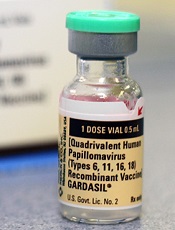
Credit: Jan Christian
Previous research has suggested a potential association between the quadrivalent human papillomavirus (HPV) vaccine and venous thromboembolism (VTE).
But a new analysis of more than 500,000 women suggests the vaccine does not increase the risk of VTE.
Nikolai Madrid Scheller, of Statens Serum Institut in Copenhagen, Denmark, and his colleagues conducted the analysis and recounted the results in a letter to JAMA.
The team used data from Danish national registries to evaluate the potential link between quadrivalent HPV vaccination and VTE.
They collected information on vaccination, the use of oral contraceptives, the use of anticoagulants, and the outcome of a first hospital diagnosis of VTE not related to pregnancy, surgery, or cancer.
They included 1,613,798 Danish women ages 10 to 44. Thirty-one percent (n=500,345) of the women received the quadrivalent HPV vaccine.
In all, there were 4375 incident cases of VTE. Twenty percent (n=889) of these women were vaccinated during the study period.
The researchers compared the incidence rates of VTE during predefined risk periods after each vaccine dose with all other observed periods in each individual (control periods). The main risk period was 1 to 42 days from vaccination.
The team found no association between the vaccine and VTE during the 42-day risk period. The crude incidence rate was 0.126 events per person-year for the risk period and 0.159 events per person-year for the control period. The incidence ratio was 0.77.
Results were similar when the researchers performed subgroup analyses by age, including only anticoagulant recipients, only exposed cases, or when adjusting for oral contraceptive use.
“Our results, which were consistent after adjustment for oral contraceptive use and in girls and young women as well as mid-adult women, do not provide support for an increased risk of VTE following quadrivalent HPV vaccination,” the researchers concluded.

